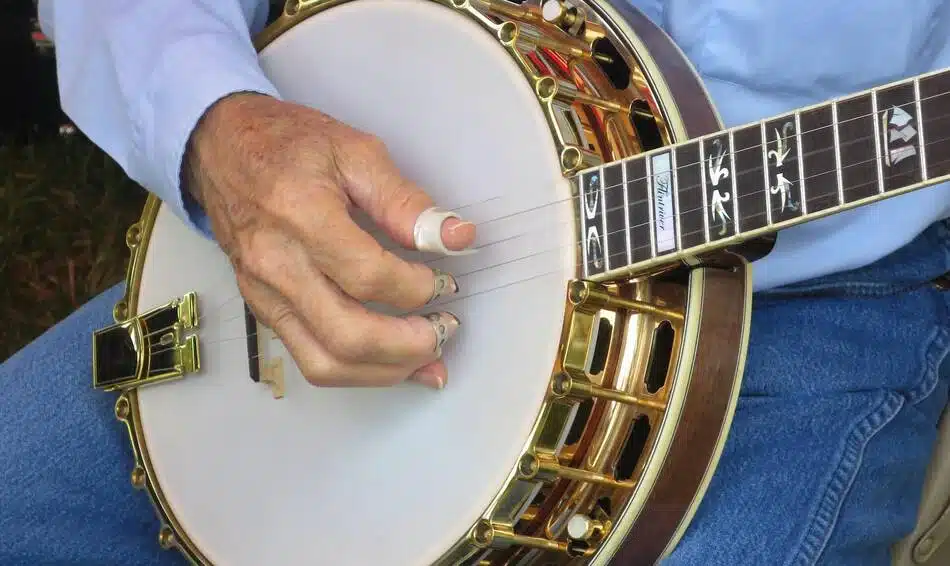
The guitar and banjo belong to the string family of musical instruments. To many people, a banjo is just a small-sized guitar. This is because guitars and banjos have a lot in common.
Since both musical instruments come with strings that are plucked to generate music or sound if your banjo string breaks and you have no means of replacing it within the shortest possible time, can you fall on guitar strings? Simply put, can you use guitar strings on a banjo?
You can use guitar strings on a banjo, provided the guitar strings are within the allowable gauge size and tension range of the banjo. Such strings will not exert too much stress on the banjo’s necks.
Difference between Banjo and Guitar Strings
The truth is the type of materials used in making guitar strings are the same as those used in making banjo strings. Due to this, companies that manufacture guitar and banjo strings use the same wires in making them.
Notwithstanding, the difference between a guitar and a banjo string is their tensile strength and diameter, also known as gauge size.
Generally, banjo strings are thinner than that of other string instruments, including guitars. To shed more light on this, the size of the first string of a light gauge five-string banjo set is usually 0.009” of an inch, while its fourth wound string is usually 0.020” of an inch.
On the other hand, acoustic guitar strings that are referred to as light gauge usually have their first string being 0.012” of an inch and their sixth string having a diameter of 0.052” of an inch.
Therefore, although these two sets are known as light-gauged strings, banjos are clearly lighter than guitar strings. This clearly shows that; guitar strings have larger or heavier gauge sizes than banjo strings.
What you should note is that strings with light gauges have a brighter tone. Light gauge strings are known to produce a bright sound with less bass and a mid-range response that is soft.
When you pluck light gauge strings hard, they end up producing an overdriven or distorted tone.
However, heavy gauge strings have a deeper and warmer tone. They are known to produce sound with clean bass and strong mid-range response. These strings are ideal for those who attack strings very hard since it gives them room to pick harder.
Another difference between guitar and banjo strings is that guitar strings are usually ball-ended while banjo strings are usually loop-ended.
When Can You Use Guitar Strings on a Banjo?
Because guitars and banjos are both string instruments with an almost similar design, most people easily assume they can use any guitar string on a banjo and vice versa. However, that is not the case every time.
The neck of every banjo has an allowable amount of tension it can handle without straining. Thus, you can only use guitar strings on a banjo if the gauge size and tension range of the guitar’s strings fit that of the banjo’s strings.
This is because every string instrument has been designed to have an ideal tension range with which its strings must conform. This tension range in guitar and banjo strings is affected by their gauge size.
Before you use guitar strings on your banjo, you need to ensure that your banjo is capable of handling the extra tension.
The best way to know if your banjo can handle the extra tension is to consult the manufacturer’s recommendations.
Most of the banjos we see around are manufactured to have strings with light gauges. Due to this, as a rule of thumb, the guitar strings that can be used on banjos are typically light gauge guitar strings that can stretch long enough.
These are usually plain guitar strings whose gauge sizes fall between 0.012 and 0.016.
When Can You Not Use Guitar Strings on a Banjo?
If you have read up to this point, then I’m certain you can answer this question to a large extent. Therefore, I will try to run through it as briefly as possible.
The type of strings you use on your banjo greatly affects the tone it produces. Not only does it affect how the banjo sounds overall, but it also affects your playability.
You cannot use a heavy gauge guitar string on a banjo. This is because heavy gauge strings add more tension to the banjo’s neck than it can handle.
Another point is guitar strings are usually ball-ended while banjo strings are usually loop-ended. Thus, most banjo tailpieces are designed to accommodate only loop-ended strings.
This means most banjos cannot accept guitar strings that are ball-ended.
That notwithstanding, there are a few banjos whose tailpieces can accommodate both ball-ended and loop-ended strings.
However, if your banjo tailpiece can accept only loop-ended strings, all hope is not lost. There is a way you can still string your ball-ended guitar strings onto them.
To do this, you need to crush the hollow brass ball end of the string into small fragments using the flat part of a plier or crusher. After crushing the hollow brass, you can simply pull out the string from the broken bits of brass.
At this stage, you can simply create a loop in the string by using a pen or nail. This leaves you with a loop-end string.
To fully understand how to go about this, watch this video.
Alternatively, you can cut off the ball with the sharp end of the plier and just create the loop in the string using a pen or nail.
However, if these hacks seem too complex for you, you should only use the appropriate strings on your banjo to avoid complicating issues.
D’Addario EJ55 5-String Banjo Strings (on Amazon) is something I’d personally recommend. It’s one of the highest-rated banjo strings on Amazon, and they easily get the job done. D’addario also has a ball-end version for banjos that accepts ball-end strings.
Can You Use Nylon Strings on a Banjo?
Most of the guitar strings and banjo strings we have are made out of steel. However, some strings are made out of phosphor bronze and nylon as well.
As you may already know, the material used in manufacturing a string also affects the way an instrument is played and the sound it produces. Nylon strings are known to produce warm and darker tones.
Though most banjos have steel strings on them, you can use nylon strings on banjos as well. In fact, nylon strings are usually used on banjo ukuleles.
By fitting a banjo with a nylon string, you give it a traditional old-time Appalachian tone. Fixing nylon strings on your banjo is easy to do. All you need to do is to widen the slots at the bridge and nut to accommodate the larger diameter than most nylon strings have.
In general, the tension in nylon strings is lower than that of steel strings. Thus, they should not put too much pressure on the neck of banjos when you use them.
However, nylon strings have a larger amplitude than steel strings. What this means is they vibrate more than steel strings.
Therefore, what you need to do when using nylon strings on your banjo is to raise the height of the string to account for how much the strings will vibrate. If you are still unsure about using nylon strings on your banjo, take time to watch this video.
To end it all, using nylon strings on your banjo is not ideal if you are a bluegrass player. This is because nylon strings do not produce the brightness that characterizes bluegrass music.
Conclusion
In summary, the difference between guitar and banjo strings can be found in their tension and gauge size. Banjo strings are thinner or lighter than guitar strings. Lighter strings are known to be less tense as well.
Despite their differences, you should not have any issues with using guitar strings on a banjo as long as the strings are within the tension range required by banjos.
This is because a banjo has been designed to have an ideal tension range within which its strings must conform so that it does not exert too much pressure on the neck of the banjo. However, if you do not know what you are doing, I wouldn’t advise you to use guitar strings on a banjo.

Hello, I’m Elijah. A writer on Geek Musician, based in Ghana-West Africa. I am a writer with a passion for research and reading. I usually spend my free time playing chess or watching movies. For more info, check out my about me page. Or read more of my articles here.

